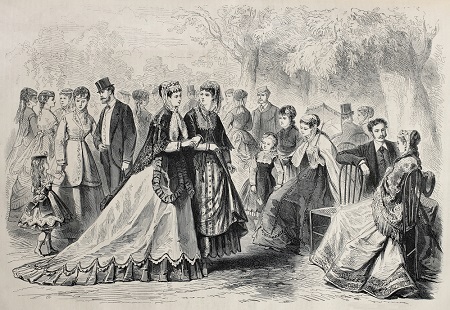Liberty Matters
Remember Female Friendships

Sarah Skwire challenges Abigail Adams’ “remember the ladies” with an important question: “Which ladies, exactly, Mrs. Adams?” It’s a terrific reminder to investigate not only who and what we remember, but why. It also prompts another reflection– who do we forget? And why?
In her 1929 essay, A Room of One’s Own, Virginia Woolf noted that for most of history, “anonymous” has been a woman. Echoing the claim in 1971, art historian Linda Nochlin asked in her seminal essay of the same title, “Why Have there Been No Great Women Artists?” Her answer was, in part, that because women had been structurally excluded from most art education and the channels which might have afforded their work a public viewing, women often did not have the opportunity to create what counted as “art,” or they were relegated to the overlooked stepsister “crafts.” If they did have the opportunity to create “art,” they often did not sign their work. To this day, whenever I see an unsigned painting, I just assume a woman did it. (And it is interesting to note that in the first edition of Sense and Sensibility, Jane Austen signed her work only, “By a Lady”)
But there’s more here, I think. There are all the women whose lives cannot be remembered in their specificity not only because the details have been lost, but because their lives were lost to the violence, degradation, and deprivation which many forms of historical misogyny have enabled. These are the victims of domestic violence, of sexual assault, of economic penury. These are the women whose stories will never be told except as statistics and who will remain forever unknown except, perhaps, by a very few.
And here’s where Elizabeth Amato’s reminder about the importance of friendship steps in for me. In the philosophical and political tradition, friendship has traditionally been gendered male. Aristotle wrote compellingly about the importance of friendship to human flourishing. His ideas about how friendship enhances not only our lives, but also our virtue can easily be extended to women. It wasn’t until relatively recently that the value of female friendships has been noted. It is the work, political and emotional, of female friendships today to ensure that the stories of women’s lives – of their triumphs and their suffering – to move beyond Jane Austen (although Jane Austen, too, wrote quite persuasively about the joys and challenges of female friendship). It is what Alice Walker is doing in her 1983 collection, In Search of Our Mother’s Gardens: Womanist Prose:it’s remembering those right next to us whose creativity, power and suffering is often unmarked, but whose gardens are there, if sometimes lost to view.
So perhaps this Women’s History Month, we might remember the ladies who were and are friends – Eleanor Roosevelt and Pauli Murray, Marilyn Monroe and Ella Fitzgerald, Martina Navritalova and Chris Evert and, of course, Thelma and Louise. Female friendship might be one of the most important ways that the stories of women’s lives are remembered and celebrated. Because if we don’t tell the stories of our friends, who will? So, when Abigail Adams says, “remember the ladies,” this month I will remember and celebrate my BFFs and the history of female friendships that helped make those life giving and soul enhancing relationships possible.
Copyright and Fair Use Statement
“Liberty Matters” is the copyright of Liberty Fund, Inc. This material is put on line to further the educational goals of Liberty Fund, Inc. These essays and responses may be quoted and otherwise used under “fair use” provisions for educational and academic purposes. To reprint these essays in course booklets requires the prior permission of Liberty Fund, Inc. Please contact oll@libertyfund.org if you have any questions.